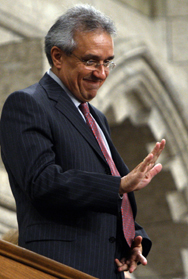By Joe Friesen
Globe and Mail
October 23, 2008
http://www.theglobeandmail.com/servlet/story/RTGAM.20081023.wCommission23/BNStory/National/ ?page=rss&id=RTGAM.20081023.wCommission23
Harry LaForme quit the Indian Residential Schools Truth and Reconciliation Commission over interference from the Assembly of First Nations, commission counsel Owen Young, speaking on Judge LaForme's behalf, said yesterday.
Judge LaForme's position as commission chairman became untenable once it was clear that the two other commissioners, Claudette Dumont-Smith and Jane Brewin Morley, shared AFN national chief Phil Fontaine's vision of a commission centred on telling the stories of survivors, rather than a commission focused more heavily on reconciliation, Mr. Young said.
"In a nutshell, this isn't government interference, it's AFN interference," Mr. Young said.
"Once LaForme was asserting independence it meant [Mr. Fontaine] was going to have less influence on where the commission was going."
 |
| Justice Harry LaForme, chairman of the Indian Residential Schools Truth and Reconciliation Commission, waves after being recognized by the Speaker in the House of Commons on Parliament Hill in Ottawa, in this April 28, 2008 file photo. Photo by Reuters |
Mr. Fontaine responded by saying there was never any suggestion that Judge LaForme had a problem with the AFN.
He also said the settlement agreement, approved by nine judges in nine jurisdictions, doesn't allow for a chair to unilaterally determine the direction of the commission.
"The agreement is very clear about the role of the AFN: we will have a central and ongoing role in the settlement agreement," Mr. Fontaine said.
While the AFN wanted the seven national events of the TRC to provide a showcase for survivors' stories, Judge LaForme had a different plan, Mr. Young said.
"Just to tell the stories as a stand-alone exercise is divisive," he said. "Harry's vision was uniting and inclusive. Those are important differences. You could feel the tension between those two views and they began to be reflected in everything between the commissioners."
In his letter of resignation to Indian Affairs Minister Chuck Strahl, Judge LaForme expressed his concern that the two other commissioners were determined to outvote him, and that they had been subject to external influence: "… the two commissioners have made it clear that their majority rule would not be grounded in Commission independence but would be shaped by the influence of some of the parties and their political representatives," he wrote.
He added that the two commissioners had compromised commission independence, lost his confidence, betrayed his trust and worked to frustrate his pursuit of what he saw as the commission's mandate.
The question of the TRC's independence came to a head when the AFN invited the commissioners to a meeting in Ottawa on Sept. 26, where many of the parties to the settlement agreement, although not the government of Canada, would be present. Judge LaForme replied that in order to maintain his independence he couldn't attend, and he recommended that his two fellow commissioners follow suit.
Ms. Dumont-Smith, a native health worker, and Ms. Morley, a non-aboriginal lawyer, ignored his recommendation and met with the AFN and other groups. Ms. Dumont-Smith said the meeting was to provide an update on the commission's progress, which had been stalled since Aug. 26, when Judge LaForme left the group's final meeting, cancelled future meetings, and told the two commissioners to communicate with him only through intermediaries.
Ms. Dumont-Smith said Judge LaForme's absence didn't please the parties at all.
"They were very concerned that it appeared things weren't moving ahead," she said.
She denied that the issue of a truth commission versus a reconciliation commission ever arose.
"There was never any [discussion] that we would be more on the reconciliatory side than the truth. I did and still believe that it's important we give them equal weight," she said.
Both she and Ms. Morley have also denied ever seeking to have the commission governed by majority rule, another objection of Judge LaForme's, but have said their preference was to follow the aboriginal custom of governing by consensus.
A day after the meeting in Ottawa, Mr. Fontaine gave a speech in Montreal in which he said, according to a transcript, "we have to be careful when we talk about the impartiality of the truth commission."
"In fact," Mr. Fontaine said, "the commission has to be partial to the interests of the survivors, because the truth commission, this truth commission is about the survivors."
Any original material on these pages is copyright © BishopAccountability.org 2004. Reproduce freely with attribution.